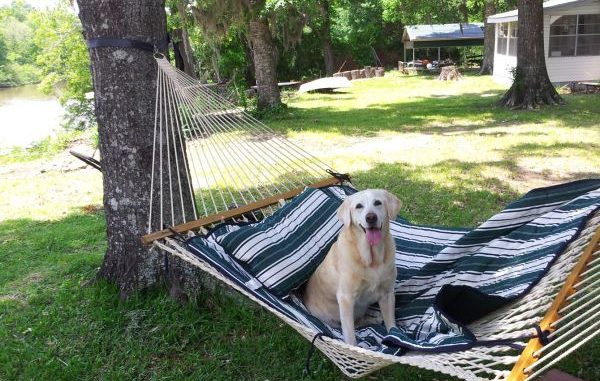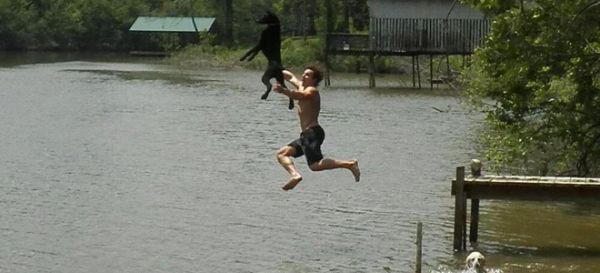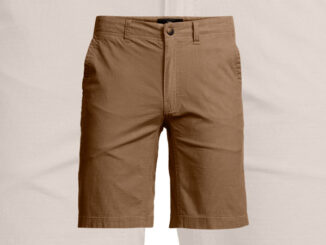
The Apex Predator provides info to know before investing in a place of your own
Anyone who has ever had one knows that special feeling when you arrive: the easy escape to freedom and adventure where your worries just seem to disappear.
I’m talking about that indescribable joy known simply as “camp life.”
Recently, I was asked to be filmed on a show about buying camps for the Discovery Channel. But I turned down the offer after I realized I would only have to pretend to buy a camp for the show. As we all know, there really is very little reality in reality television. Even on the game warden shows, the criminal activity is often faked. I see nothing wrong with entertainment and acting, but felt it was more important to maintain my integrity by giving honest accounts of my adventures.
Ever since I can remember, my weekends and summer vacations from school were spent at our family camp along the Gulf in Cocodrie. Fishing, hunting, crabbing and relaxing on the hammock in the sweet marsh breeze all added up to great times and wonderful memories. My only fear growing up was of losing my camp every time a tropical system started to brew.
After my parents divorced when I was a teenager, I suddenly became camp-less. Camps cost money, a valuable commodity when one household becomes two. For a brief while, I used a camp at Grand Isle for weeks on end, but it was decimated by Katrina.
So with no place to call my own except a tent, I headed north on my winter weekends. Tenting out alone since the age of 17 on the state’s wildlife management areas was pretty rough at times. No electricity, ice cold bucket baths and unfriendly critters stealing my food provided conditions that helped shape me into the tough hunter that I am today.
I caught catfish from the bank and learned how “not to” deer hunt, but every chance I had, I’d head north and hit the roads for another adventure.
After several years, I finally did learn how to deer hunt and started saving for a camp to call my own. But being fresh out of college and on a tight budget, saving would take a while. Getting that “camp feeling” was so important I decided to live with my mother until I was 26 to save every penny. With a house note and bills, saving for a camp would’ve been impossible. I guess my thirst for outdoor adventure far exceeded growing up on my priority list.
But I learned lots of lessons along the way, too. During one Thanksgiving doe weekend, I unknowingly set my tent up in a low spot. During the middle of the night, powerful storms moved through, and the next thing I knew, I woke from a dream where I was floating in the sea. But I wasn’t just dreaming: my air mattress was literally floating in a foot of water. After that, I had enough with spending nights listening to a windy flap and digging trenches around a tent.
So I bought a cheap 6-foot by 10-foot boxed cargo trailer for only $2,000. With an added bunk bed, it was perfect for keeping me and my gear out of the harsh winter elements. For years, this home on wheels was my palace.
Finally, after years of searching for an actual camp, I came across a deal of a lifetime. An elderly woman living in an old four-bedroom house the size of a double-wide was selling her place. It was a perfect set-up, and even better, it was located on the water with its own boat launch in the same yard as my friend’s camp.

I told my girlfriend at the time I was finally buying a house. Since I already had secret plans of proposing and moving in with her, I took everything I had saved and purchased it. Soon she realized that the house I bought wasn’t just to move out of my parent’s home. The real reason was to get a camp, and the best news was, she said, “Yes.”
Now that we’re married, my wife gets to join me in the comforts of our camp, “Cougar’s Mead,” every chance she gets. This has worked out great, since there was no way she would venture out every weekend of hunting season living in that wooden cargo box on wheels. While I did manage to lure her to stay there once, getting splinters and having spiders crawling in the bed sheets didn’t give her the same homey feeling the trailer gave me.
Camp Buying Tips:
Price
Since I transitioned from being a coastal fisherman to a diehard deer hunter, I got a camp and land up in Concordia parish for $45,000 next to my friend’s camp, who paid $37,000 for his place. Prices vary throughout the state, but in rural areas nice places with the land can be found dirt cheap because they offer few city comforts. But for an outdoorsman, it’s everything you need.
Leases
Many times hunting leases have camps, but you are at the mercy of the landowners and other members to keep the place. And prices can change in an instant. If you can afford it, buying the land outright is beneficial because leased land prices tend to go up each year.
Public Lands
There are hundreds of thousands of acres of free public lands within an hour’s drive of my camp. Besides the abundance of free trophy deer, hog, turkey, duck and small game animals to hunt, I learned about the great catfish and crappie fishing in front of the camp and at nearby Lake Concordia. Many places located directly adjacent to public land will cost double, so try looking for locations a few miles away from your favorite tract.
Safety
Talk to neighbors about how safe the area is from a security standpoint. Luckily, the only thieves in my area are the raccoons who steal the trash, then scatter it throughout the yard.
Hunt Days
Look into the length of huntable days allowed for the weapons you intend to use at your camp. Many public lands have a relatively low number of gun and primitive days. Also, check into dog hunting. A friend of mine bought a great place, or so he thought. After seeing deer every hunt during bow season, they went completely nocturnal as soon as dog hunters started running dogs near his private woods in Mississippi.
Inspection
Careful inspection is important because you might soon find yourself fixing lots of problems at a used place. I had to redo the bayou’s dock, electrical work, water heater and fix some broken gates after my purchase, but talking the owner down about $10,000 on the sale price to cover these repairs was a wise move.
Searching
To find places, the best way is to just drive around near your favorite hunting and fishing areas and ride the roads looking for signs on available properties. Many people don’t advertise other ways because of the expense involved. LIke they say, the best deals are often the ones hardest to find.
Flooding
Waterfront locations tend to cost more, but on lesser known lakes and bayous, this isn’t always the case. Be sure to avoid flood-prone areas. Historical flood data can be found online at www.rivergages.com. Be sure to check the January rainy season, as well as how late-spring Mississippi River flooding affects the area.
Elements
Saltwater camps have their own amazing opportunities, too, but many storm-worthy places have a huge price tag. Hurricanes can give yearly stress attacks, and maintenance is definitely higher with salty corrosion. I personally find that freshwater camps not associated with rising tides are relatively low maintenance year-round.
Portability
If traveling is more to your liking, getting a camper is a wise investment. If you’re on a budget, look into plain cargo trailers and customize them yourself to meet your specific needs. And even if huntable lands don’t have a campground, nearby truck stops make for great places to spend the night.
No matter where your favorite getaway is located, stress melts away and the outdoors are enhanced when there is a home off the beaten path to call your own. To me, nothing is sweeter than lying in my hammock after a good morning of fishing or hunting and soaking up the camp life.


